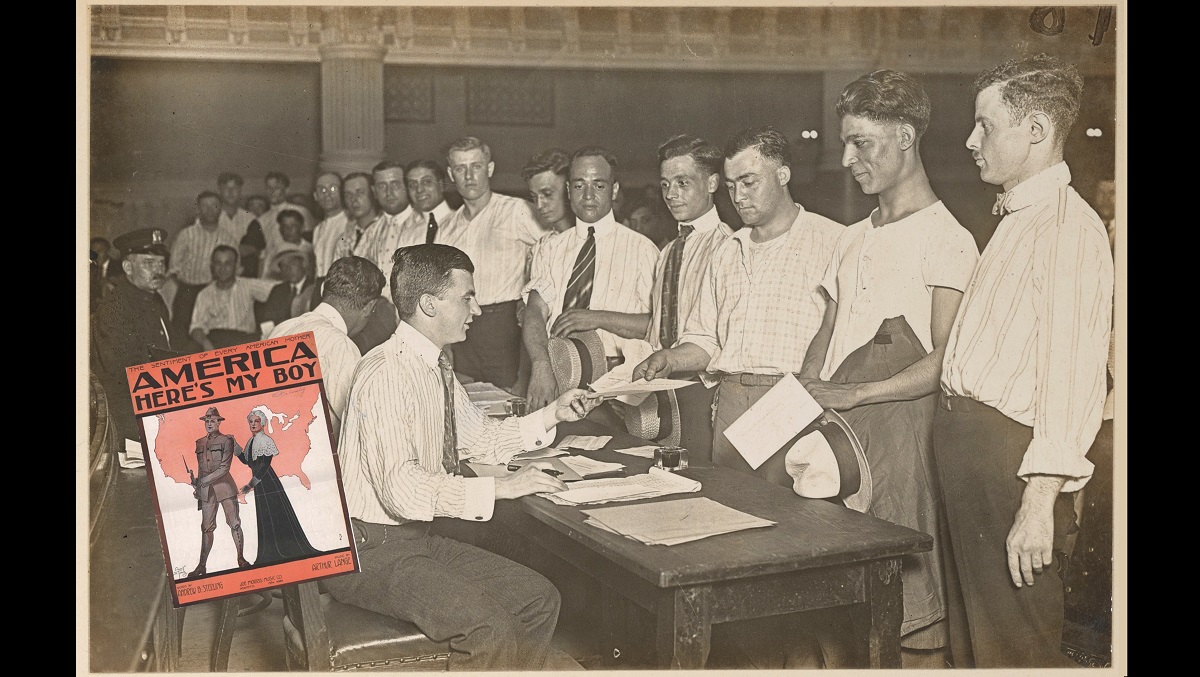
In the closing scene of James Michener’s novel The Bridges of Toko-Ri, an admiral thinks of the aircrew he just sent to the Korean conflict–some never to return–and asks, “Where did we get such men?” President Ronald Reagan asked the same question years later at the Medal of Honor presentation to Master Sergeant Roy P. Benavidez, speaking of both the awardee and his many comrades in Vietnam. It is often overlooked that many who served in both of those conflicts came from the activated reserve forces and selective service. During their year at the Army War College, Kent Park and Stephen Trynosky examined the challenges if we had to again rapidly expand the army for a large war. They join podcast editor Ron Granieri to discuss their research on the topic and their concerns that the U.S. is not adequately prepared for a major conflict with a near-peer threat, such as China or Russia. Park and Trynosky argue that the U.S. needs to take steps to increase its personnel readiness long before the shadow of great power conflict appears because timelines in the modern global security environment are much more compressed than in previous conflicts.
If there is a large-scale combat operation and we start sustaining casualties, in order for us to be able to continue the fight and sustain the fight based on the time available and the number of reserves that are available, we would have to almost immediately start to reauthorize the draft. And again, that just does not give us a chance to have a national dialogue and to start thinking about what does this actually mean. And there are a lot of problems with reinitiating the draft right now.
Podcast: Download
Kent Park is a 1999 graduate of the United States Military Academy and colonel in the U.S. Army. He has served in a variety of command and staff positions in Korea and also in Iraq. Colonel Park attended the Harvard Kennedy School of Government and earned a master’s degree in public policy there, before returning to the U.S. Military Academy to teach American politics in the Department of Social Sciences. He was a member of the Carlisle Scholars Program and a graduate of the AY23 Resident Course at the U.S. Army War College.
Stephen Trynosky is a lieutenant colonel in the Medical Service Corps of the Army Reserve and a career federal employee. Following graduation from the War College, Lieutenant Colonel Trynosky will serve on active duty as the senior military advisor and practitioner in residence at the George Washington University’s Elliott School for International Affairs. He holds both Juris Doctor and Master of Public Health degrees from the State University of New York at Buffalo, as well as a Master of Military Arts from the U.S. Army Command and General Staff College and a BA in history from Saint Peters College. He is a graduate of the AY23 Resident Course at the U.S. Army War College.
Ron Granieri is Professor of History and the Chair of the Department of National Security and Strategy at the U.S. Army War College and the Editor of A BETTER PEACE.
The views expressed in this presentation are those of the speakers and do not necessarily reflect those of the U.S. Army War College, U.S. Army, or Department of Defense.
Photo Description: Men lined up at the exemption board in New York City for the World War I draft, February 1918. Inset: 1917 Cover of sheet music from the popular tune America Here’s My Boy
Photo Credit: Photographer unknown courtesy of National Archives – Identifier 45543491; Inset: Joe Morris Music Co., New York





America is controlled by self-serving traitorous sheep. The progressive socialist Marxist education system has sabotaged general population achievement and fitness. China has been winning their Cold War against capitalism and democracy for over 25 years.
No, they gave our jobs to china, got fat, China predictably built a military, with the money we should have earned. And now want us to fight over it. China is more fascist than communist, but that is the line they keep trying to feed. I am curious to see how they handle the obesity problem. They are on their own.
Famine and food rationing will probably be how they handle the obesity problem.
A lot of things that are romanticized now came from some kind of authority-created screw-up. Like “Victory Gardens”. A contributing factor to those being needed was the internment into camps of so many Japanese-Americans in WW2, many who were responsible for produce.
Times have changed though; you can find a lot of people who are aware of General Smedley Butler and “War is a Racket”. Some of those same people know the role of Rockefeller in getting Nixon to go to China, interestingly close to the same time the US went off of gold, and the World Economic Forum was founded by Klaus Schwab. (I believe in coincidences, but I don’t trust coincidences)
https://www.armyupress.army.mil/Portals/7/military-review/Archives/English/MilitaryReview_20120831_art011.pdf
MAJ Hendell,
Thanks for stopping by and sharing a link to your forward thinking piece from 2012 for the audience. You were way ahead on this issue and the Army would be healthier today if your prophetic words of caution received the attention they deserved at the time. I am personally indebted to the time and support you provided me amidst your own mobilization as I started this research project. Thank You!
– LTC S.K. Trynosky
If we have — for some time (and even now) — not addressed the manpower, logistics, etc., problems/requirements relating to such things as large-scale combat operations and, more generally, great power competition,
Then does this not suggest — to everyone and all concerned — that we simply do not see such things as large-scale combat operations, and more generally such things as great power competition, as, in fact, being our current paradigm/as being something that we really need to be concerned with (and/or actually believe in)?
From that such perspective — if we do not really believe that our paradigm today, actually, is (a) great power competition; wherein, (b) large-scale combat operations are likely to be an integral part — when what, exactly and actually, do we believe in as our current paradigm?
My thought above possibly stated another way:
Typically(?), if one sees one’s conflict environment as being best explained from a great power competition (GPC)/large-scale combat operations (LSCO) point of view, then, in cases such as these, the manpower (writ large) requirements of such a perspective (whole of society?), this would normally (?) mandate and dictate that such things as “assimilation” (which denies such things as DEI and multiculturalism?) would be the order of the day. Why? So as to “assimilate minorities into the dominant national group, thus forging a nation people that could meet the external enemy with a united front, thereby denying that enemy any opportunity to exploit potentially dangerous rifts within the nation.” This, after all, is what we did in our last GPC/LSCO conflict environment case of the Old Cold War(?)
However, if one sees one’s conflict environment as being best explained from a great power competition (GPC)/economic competition (EC) point of view, then, in circumstances such as these, the manpower requirements — writ large — (whole of cultures?) of such a perspective, this would mandate and dictate (?) that such things as “integration” (which embraces such things as DEI and multiculturalism?) would be the order of the day. Why? So as to “exploit the advantages it (integration) would bring to American businesses in their international transactions.”
(As to the larger quoted items provided in my two main paragraphs above, see beginning at the middle of Page 704 — and extending over to Page 705 — of the Catholic University of America, Columbus School of Law paper “Moral Communities or a Market-State: The Supreme Court’s Vision of the Police Power in the Age of Globalization” by Antonio F. Perez and Robert J. Delahunty.)
Thus, if the powers that be (exception: the current U.S. Supreme Court: see the recent case of “Students for Fair Admissions v. University of North Carolina and Students for Fair Admissions v. Harvard College”) still see our current conflict environment from a GPC/EC point of view — and, thus, continue to pursue such things as “integration,” DEI and multiculturalism instead of such things as “assimilation” — then, from that such perspective, how can suggestions that GPC/LSCO is current conflict environment be considered seriously?
(Such things as RECRUIT, RETAIN, DRAFT, at least in part, thus to be seen from this such perspective?)
Possibly stated in a different and/or more succinct way:
If, in other periods of U.S. history, when such things great power competition and the ENORMOUS manpower requirements of large-scale combat operations prevailed (exs: World War II; the Old Cold War?); if during these such times, the U.S. embraced “assimilation” rather than “integration,”
Then why, in our current era of great power competition, and the ENORMOUS manpower requirements of large-scale combat operations, would the U.S. embrace “integration” rather than “assimilation” ???
(Herein to note that the other great and/or powerful nations of today — such China, Russia, India, etc. — these folks, re: their great power competition and ENORMOUS manpower requirements of large-scale combat operations; these folks — ALL it would seem — have moved out smartly, of late, to replace “integration” with “assimilation” ???)
Thus, from a great power competition, manpower needed for large-scale combat operations, national security and RECRUIT, RETAIN and DRAFT point of view, which nation(s) have made the proper and/or wiser choice?
Reinstituting a Draft or anything similar will require destroying common errors about the Draft during Vietnam first. Say Draft and the response is almost always.
Among the common errors are:
2/3 of the men who served in Vietnam were volunteers. 2/3 of the men who served in World War II were drafted. Approximately 70% of those killed in Vietnam were volunteers.
86% of the men who died in Vietnam were Caucasians, 12.5% were black, 1.2% were other races.
I heard the errors about these facts some 35 years after Vietnam ended while teaching in a high school in Watts. The oft-heard preamble, “Everybody knows…” reared its ugly head once again – facts be damned. The point being any change or reimposition of The Draft needs to squash these types of persistent myths.
Graduating in the 1960s, the Draft card was a “rite of passage” into adulthood for most teenagers. It came into its own when college professors and their students centered their animosity for the Vietnam War, often for personal reasons, on the card.
Having draftees in an organization was usually a beneficial thing for both the Army and the draftee, as some decided to stay in the service.
The “recruit, retain, draft” problems that the U.S. would seem to have today, might these, possibly, be best seen from the perennial/the “what is old is new again” perspective provided below? In this regard, let us first consider this quoted item:
“Capitalism is the most successful wealth-creating economic system that the world has ever known; no other system, as the distinguished economist Joseph Schumpeter pointed out, has benefited ‘the common people’ as much. Capitalism, he observed, creates wealth through advancing continuously to every higher levels of productivity and technological sophistication; this process requires that the ‘old’ be destroyed before the ‘new’ can take over. … This process of ‘creative destruction,’ to use Schumpeter’s term, produces many winners but also many losers, at least in the short term, and poses a serious threat to traditional social values, beliefs, and institutions. … ” (From the book “The Challenge of the Global Capitalism: The World Economy in the 21st Century,” by Robert Gilpin; therein, see the first page of the Introduction chapter.)
Thus:
If one’s traditional social values, beliefs and institutions are under attack/assault — once again — in this case, however, (a) NOT BY the political, economic, social, value, etc., “revolutionary changes” that are demanded and required by those promoting such things as socialism and/or communism but, rather, (b) BY the political, economic, social, value, etc. “revolutionary changes” that are — perennially and never-endingly — are demanded and required by those promoting such things as capitalism, markets and trade (see my quoted item above),
Then, in times such as these, might finding status-quo-loving-and-dependent individuals and groups — who are willing to fight and die so as to (a) ACHIEVE these such unwanted “revolutionary changes” and thus to (b) OVERTHROW the power, influence, control, etc., that these status quo folks currently enjoy — might this, indeed, be a rather difficult task?
Given this such understanding, then might the having of a real and/or suggested EXTERNAL ENEMY — in these such INTERNAL CONFLICT times — might this, indeed, be rather beneficial?
(Or maybe not; this especially, if this such external enemy declares himself to be, for example, the champion — the savior — of such things as traditional — and/or civilizational — values, beliefs and institutions?)
Consider my thoughts above from the following — complementary I believe — perspective:
“All in all, the 1980s and 1990s (and the 2000s and 2010s also, Muller’s book was written in 2002) were a Hayekian moment, when his once untimely liberalism came to be seen as timely. The intensification of market competition, internally and within each nation, created a more innovative and dynamic brand of capitalism. That in turn gave rise to a new chorus of laments that, as we have seen, HAVE RECURRED SINCE THE EIGHTEENTH CENTURY: Community was breaking down; traditional ways of life were being destroyed; identities were thrown into question; solidarity was being undermined; egoism unleashed; wealth made conspicuous amid new inequality; philistinism was triumphant.” (Emphasis added. From the book “The Mind and the Market: Capitalism in Western Thought” by Jerry Z. Muller; therein, see the chapter on Friedrich Hayek.)
As can be seen from the above, post-the Old Cold War, it is not dynamic socialism and/or communism — but rather dynamic capitalism, markets and trade — that threatens conservative/status quo-loving-and-dependent individuals and groups in the U.S./the West and, indeed, throughout the entire world; this, much as these such entities have been threatened — by these such forces — perennially — since at least the dawn of modern capitalism in 18th Century.
Given that this, accordingly, is such an exceptionally old, extremely well-known, extremely well-understood and, thus, very familiar scenario, then what can we learn from the past; this, with regard to how RECRUIT, RETAIN, DRAFT problems — in these such scenarios — were handled in times past?
As per my last paragraph immediately above, as yet another way of showing that (a) dynamic capitalism, markets and trade is what (b) threatens conservative/status quo-loving-and-dependent individuals and groups in the U.S./the West today and, thus, (c) may make the RECRUITING, RETAINING AND DRAFTING of these such specific groups — to essentially fight dynamic capitalism, markets and trade’s “wars” both at home (via the military’s example) and abroad (via our force of arms) problematic today — as to this such contention, consider the following suggested relationship between “neoliberalism,” “multiculturalism,” “globalization” and “free market expansion:”
“Neoliberalism is inherently a multi-cultural (diversity-appreciating) endeavor because of the globalization intrinsic to free-market expansion.” (See the abstract of the paper “Neoliberalism Multiculturalism: The Diversity that Divides Us” by Michael Kreiter, Department of Sociology, Boise State University.)
Question — Based on the Above:
If, essentially, “free-market expansion” is what you are going to be fighting for today — a “free-market expansion” which — due to such things as DEI, multiculturalism, etc., tends to undermine the power, influence, control, status, privilege, control, safety, security, etc., that your group currently enjoys (or recently enjoyed) — then might you, indeed, hesitate at joining such a force? A force whose purpose is as I describe it above?
Maybe the US needs a Jubilee like ancient Israel had, taking place every 50-years, to make the US become and stay a meritocracy.